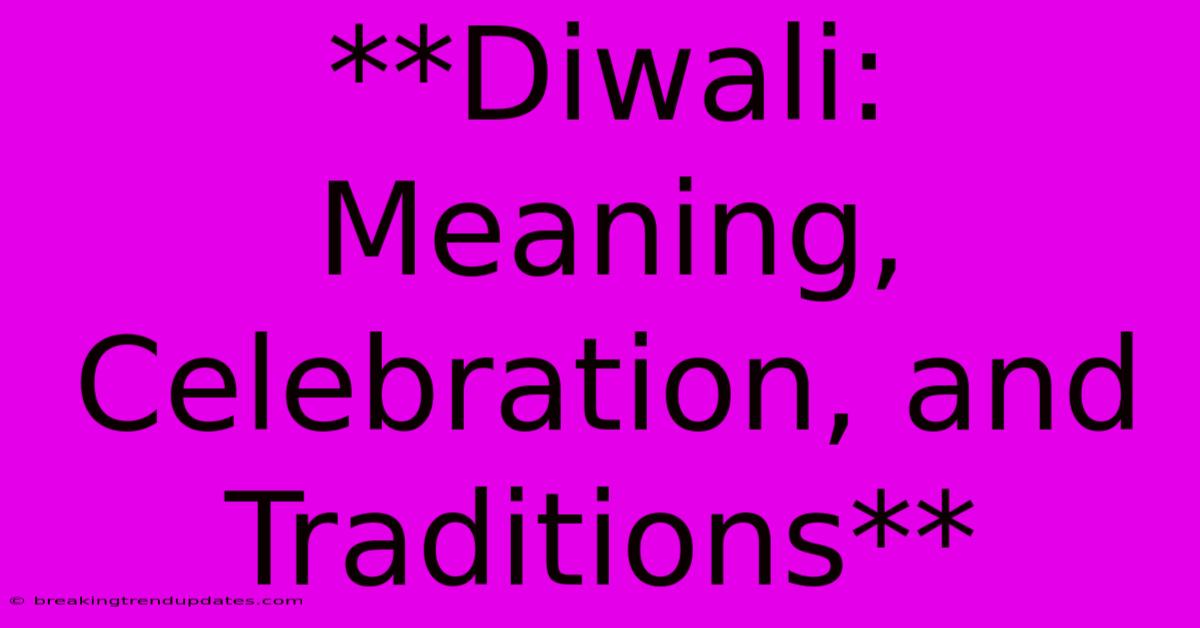**Diwali: Meaning, Celebration, And Traditions**

Discover more detailed and exciting information on our website. Click the link below to start your adventure: Visit Best Website breakingtrendupdates.com. Don't miss out!
Table of Contents
Diwali: Meaning, Celebration, and Traditions
Diwali, also known as the Festival of Lights, is a major festival celebrated by Hindus, Sikhs, and Jains across the world. It is a vibrant and joyous occasion that marks the victory of light over darkness, good over evil, and knowledge over ignorance. Diwali is a time for families and friends to come together, celebrate, and share happiness.
The Meaning of Diwali
The word "Diwali" is derived from the Sanskrit word "Deepavali," which means "row of lights." The festival is celebrated for five days, each day having its own significance and rituals. The main day of Diwali is usually celebrated on the new moon night, which falls in the month of Kartik (October/November) according to the Hindu lunisolar calendar.
Diwali symbolizes the victory of Lord Rama, an incarnation of Vishnu, over the demon king Ravana. This victory represents the triumph of good over evil and the restoration of dharma (righteousness) in the world.
How Diwali is Celebrated
Diwali is celebrated with great enthusiasm and fervor. Here are some of the common traditions:
- Cleaning and Decorating: Homes and businesses are thoroughly cleaned and decorated with lights, diyas (clay lamps), rangoli (colorful designs made on the floor), and flowers.
- Lighting Diyas and Candles: Lighting diyas and candles is a significant part of the celebration. The light from these lamps symbolizes knowledge, prosperity, and hope.
- Firecrackers: While fireworks are not an integral part of Diwali, they are often used to celebrate the festival in many regions.
- Puja and Prayers: On the main day of Diwali, people perform puja (prayers) to Lakshmi, the goddess of wealth and prosperity.
- Feasting and Sweets: Diwali is a time for feasting and enjoying traditional sweets like laddoos, barfi, and gulab jamun.
- New Clothes and Gifts: People wear new clothes, exchange gifts, and visit friends and family.
Traditions and Significance Across Different Regions
While the core essence of Diwali remains the same, there are variations in its celebration across different regions of India and the world. For example:
- North India: In North India, Diwali is mainly associated with the Ramayana story, and people celebrate the return of Lord Rama to Ayodhya after defeating Ravana.
- South India: In South India, Diwali is also known as "Naraka Chaturdashi" and is celebrated as the victory of Lord Krishna over Narakasura.
- West India: In West India, Diwali coincides with the festival of "Bandi Chhor Divas" celebrated by Sikhs. This festival commemorates the release of the sixth Sikh guru, Guru Hargobind, from imprisonment.
The Significance of Diwali Today
Diwali remains a significant festival in the modern world, representing the triumph of good over evil and the power of light over darkness. It serves as a reminder to embrace knowledge, love, and compassion in our lives. It is also a time for reflection, forgiveness, and renewal.
Diwali is a celebration that transcends cultural boundaries and unites people from different backgrounds in a spirit of joy, hope, and goodwill. It is a time for families and friends to come together, share memories, and create new ones.

Thank you for visiting our website wich cover about **Diwali: Meaning, Celebration, And Traditions**. We hope the information provided has been useful to you. Feel free to contact us if you have any questions or need further assistance. See you next time and dont miss to bookmark.
Thank you for visiting our website wich cover about **Diwali: Meaning, Celebration, And Traditions**. We hope the information provided has been useful to you. Feel free to contact us if you have any questions or need further assistance. See you next time and dont miss to bookmark.
Featured Posts
-
Court Rules Hanson Racially Vilified Faruqi
Nov 01, 2024
-
Jets Defeat Texans Strouds Rough Start
Nov 01, 2024
-
Chifre Na Testa Misterio Medico Em Idosa
Nov 01, 2024
-
Sinkende Gaspreise Was Bedeutet Das
Nov 01, 2024
-
Ao Vivo Fc Porto X Moreirense Taca Da Liga
Nov 01, 2024
